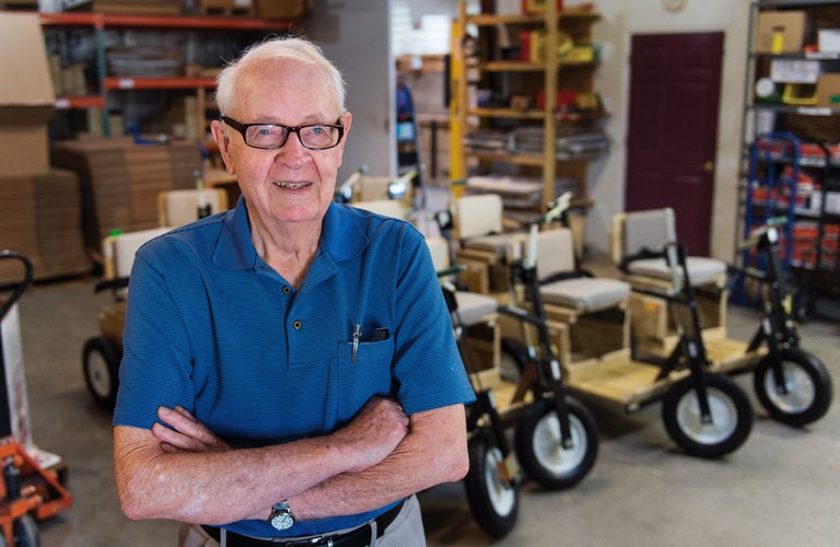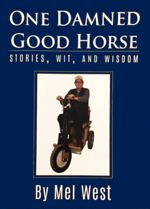
Mel West is a Columbia, MO author who recently came out with his debut book, “One Damned Good Horse.” The book contains essays and stories, tracing his youth as a Missouri farm boy through his time at the University of Missouri and service during World War II to his time as a dairy farmer, a Methodist minister and an internationally known humanitarian. At the age of 70, he started what is now known as Mobility Worldwide, an organization based in Columbia, MO that makes three-wheeled, hand-cranked mobility carts to give to leg-disabled people in more than 100 developing countries around the world. All the money from sales of the book go towards building more mobility carts. I recently emailed some interview questions to him, and he was kind enough to take time to write back some answers.
 Daniel Boone Regional Library: A recurring theme in your book is the benefits of serving other people. What have you learned from serving others?
Daniel Boone Regional Library: A recurring theme in your book is the benefits of serving other people. What have you learned from serving others?
Mel West: I have learned the great satisfaction of JOY.
Rabindranath Tagore put it this way:
I slept and dreamed that life was joy.
I awoke and found that life was service,
I acted, and behold, service was joy.
Joy is beyond fun. Let me put it this way: At a Jimmy Carter house build (and I’ve been to several) 500 volunteers gather and in five days build 25 houses, complete with trees, shrubs, grass, etc. That is fun—the comradeship of working together, making friends. But on Saturday we help move the families in. We see children finding their rooms. We see mothers touching the kitchen appliances with reverence. We see dads setting up play equipment. We have seen the shack whence they came—and Saturday is JOY.
To get full “payback” from our giving we must “walk a mile in the shoes” of those to whom we give service. I still write a lot of checks for programs that help folks I will never meet, and will continue to do so. It is fun to write such checks. For example, when I send money to a student who lives inside a dirt floored mud-stick hovel in rural Nicaragua (a student with whom I correspond, and who I have met), enabling that young person to go through high school and college, and even receive a copy of their diploma—that is JOY.
There is this triune: “I will understand only that which I know, I will respect only that which I know, I will protect only that which I respect.” The lesson here is to read widely about social-human problems—talk to a wide variety of persons. If a vote, for example, is coming up on increasing the minimum wage—talk to several people (waitresses, motel maids, etc.) who are trying to survive on the now minimum wage. Talk to business people who hire people at a minimum wage. Get to KNOW, UNDERSTAND, RESPECT AND PROTECT. Cast a vote “for” the raise in minimum wages to $15 because you have talked to several persons trying to survive on less, and casting that vote will be JOY.
DBRL: What did you enjoy the most about writing this book? In what way did it challenge you?
West: I found JOY in writing the book. I am a writer and a storyteller. After 97 years of learning, I have a lot to write about—many, many stories to tell.
Sarah Hill is a friend of mine, and she asked me to put my stories on Facebook. I did not want to. To me it was a bunch of self-focused trivia and I had no time for it. “That is why you should put your stories on,” she said. “People need your stories.” So, I did, and it was a thing of joy. I got such wonderful feedback. Older people said my stories caused them to relive their own lives. When I closed it out at 5,000 readers (all that was allowed by Facebook), it was just taking too much daily time to manage, and I had family responsibilities. Fortunately a friend, Jeff Moran, asked for permission to select stories and put them into a book. He did a great job, and profits go to Mobility Worldwide MO – Columbia. Almost daily I get calls or letters from folks thanking me for the book, and telling me how much they enjoyed the book.
The challenge was two-fold. First, to come up with, each day, a page. The second was just trying to be faithful to the thousands of Facebook readers I had as I did the blogs—answering questions, sorting out folks who wanted to be “a friend,” and trying to do that all from an already busy computer. I had folks from about 30 countries as “friends.”
Another item: A 90+ year old mind needs to be exercised daily to keep it alive. Remembering the stories of my life and putting them into print has been a good mental exercise.
DBRL: You write that you are a promoter of the idea that “the world is becoming a better place in which to live, day by day.” How do you encourage others to see the world from this point of view?
West: The world is, indeed, becoming a better place in which to live, and doing so daily. The problem is the difference between reality and assumptions. We are really not very well educated in a lot of things that really matter. So many do not have a worldview, or read widely, or watch good TV.
I have, right now, an ingrown toenail. If I went to a doctor and they first did vital signs, the doctor might say, “Mel, you are in very good health—blood pressure, blood tests, body mass. What is the problem?” I might say, “Oh, Doc, I have this ingrown toenail. It is just killing me.” I would be giving my attention to the toenail, not thinking about how fortunate I really am. By one survey, 87% of our people think the world is steadily getting worse. They are giving their attention to the “toenails.” That is what is on the news. It is gossip. We ignore the fact that:
- World poverty has dropped DRAMATICALLY in the last 20 years.
- Far more people in the world have potable water, sanitary toilets, etc.
- Far more of the world’s children are vaccinated for childhood diseases than ever before.
- Far fewer children die in the first five years of their life.
- Far more children are in school, especially girls.
- WOMEN ARE GAINING THEIR PROPER PLACE IN THE WORLD.
- Birth rates per woman are dropping all over the world.
That list could go on and on, and I have the data. Families are now able to afford/have those things they count most dear—decent housing, basic food, education and health care. That has been going on since long before I was born, has increased during my lifetime, and will continue long after I die.
DBRL: In the preface, you mention that you wrote this book as “pay back of thanks for the inspiration I find in the writing of others.” Could you name a few books that you’d recommend others read?
West: I am an avid reader, and have been since I was small child. I read two newspapers a day—a local and the New York Times. I also read several periodicals: Christian Science Monitor (weekly—and the best), The Week, National Geographic, Sojourners, Smithsonian Magazine, The Economist, Missouri Soybean Farmer, The Farm Journal, The Missouri Methodists, UMNews, and the cartoons in the New Yorker. I read about two books a month. Some I especially recommend: “The Second Mountain” by David Brooks, “The Road To Character” by David Brooks, “American Dirt” by Jeanine Cummins, and “This Land,” by Dan Barry.
One reason for my writing is very logical—if my life and mind have been enriched by reading the writing and stories of others, and my writing will enrich the lives of others, I must write and share. We all have many, many stories of interest stored up on our minds and hearts. Share. It is a responsibility. If someone brings you a pie on a plate, do not send the plate home empty. Put some cookies on it. If you are enriched by the stories of others, share your stories.
DBRL: Where can readers get a copy of your book?
West: Readers can get a copy of the book by sending a $25 (postpaid) check to:
Mobility Worldwide MO – Columbia
4825 E. Meyer Industrial Dr.
Columbia, MO 65201
573-886-7877
They can also stop in at Mobility Worldwide and get it for $20.00. An ebook version is available at Amazon, Lulu, Barnes & Noble, and Google Play.



